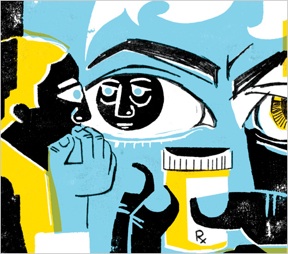One of the many reasons I very much respect my doctor, Milena Hruby Smith, is that she is extremely modest and humble. And while some patients are reassured by a doctor who delivers his assessment in an unequivocal, confident style that says “there is no other way,” I am refreshed by a psychiatrist is absolutely honest with me and says, “I can’t say for sure, but I THINK that this is what might be going on. Let’s at least give this treatment a try.”
Now mind you, I’ve had the magician before, who swore with a few medication adjustments he could practically cure me from my bipolar disorder. When I asked him how he could be so certain that I was bipolar, and why he insisted on treating me with atypical antipsychotics even though I had difficulty tolerating them in my past, he became quite snippy with me and said, much like Sr. Carol in the third grade with her ruler, “Ms. Borchard. You ARE bipolar. End of story.”
The other week when I went to Dr. Smith after a turbulent month, she told me about the growing amount of research suggesting that antidepressants aren’t helpful for persons with bipolar disorder who are bothered by depression more than mania (which is just about everyone with bipolar disorder.
“Huh?” I asked. “I don’t understand. So then why have you been treating me with antidepressants?”
She smiled (and believe it or not THAT reassures me much more than any fake sermon about how a doctor is going to cure me) and explained her reasoning: given the older research suggesting that antidepressants are helpful, and the clinical experience of herself and those who trained her that antidepressants seem to be helpful in some patients, it is still very reasonable to use them, especially for someone like myself whose manias have been much less dangerous than the depressions. In other words, for a person with an illness like mine, the risks of worsening the illness by use of antidepressants are outweighed by the risks of not treating depression aggressively. Furthermore, Dr. Smith suspects that physicians may eventually have more specific classifications of the bipolar spectrum that will allow for more targeted treatments.
The next time that Dr. Smith and I talked she apologized for telling me too much about psychiatry.
“I hope I didn’t confuse you too much, or leave you feeling insecure about your treatment,” she said.
“No, please don’t apologize,” I responded. “I appreciate your honesty and humility more than you know. Believe me, I had a cocky doctor who almost killed me. I value your sharing the uncertainty of science with me.”
She then mentioned the book, “How Doctors Think,” the New York Times bestseller by Jerome Groopman, M.D., and how people are more likely to be aware of the shortfalls of psychiatric diagnosis and treatment, but assume that other fields, such as pediatric cardiology, stand on firmer ground.
I recommend this book to everyone who sees a doctor, which is pretty much everyone (save the Scientologists).
Not only does Dr. Groopman come across as a wise and empathetic physician, but a compassionate, humble, and giving person–probably husband and father and brother, aside from his role in the medical community.
Writes Groopman in his introduction:
No one can expect a physician to be infallible. Medicine is, at its core, an uncertain science. Every doctor makes mistakes in diagnosis and treatment. But the frequency of those mistakes, and their severity, can be reduced by understanding how a doctor thinks and how he or she can think better…. Because doctors desperately need patients and their families and friends to help them think. Without their help, physicians are denied key clues to what is really wrong. I learned this not as a doctor but when I was sick , when I was the patient.
We’ve all wondered why a doctor asked certain questions, or detoured into an unexpected areas when gathering information about us. We have all asked ourselves exactly what brought him to propose a certain diagnosis and a particular treatment and to reject the alternatives. Although we may listen intently to what a doctor says and try to read his facial expressions, often we are left perplexed about what is really going on in his head. That ignorance inhibits us from successfully communicating with the doctor, from telling him all that he needs to hear to come to the correct diagnosis and advice on the best therapy.
So I advise you: If you haven’t already, invest in a THINKING doctor, one that isn’t absolutely positive about the one right way to treat you and admits to the uncertainty of psychiatry as a field of study.
To read more Beyond Blue, go to www.beliefnet.com/beyondblue, and to get to Group Beyond Blue, a support group at Beliefnet Community, click here.

